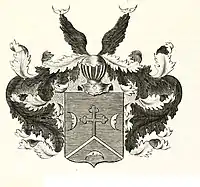
The Turchaninov family (Russian: Турчанинов, sometimes transliterated as Turchin) was a name of the several noble families in the Russian Empire. The name Turchaninov might have originated from the archaic word turchanin (Russian: турчанин), meaning "Turk".[1] That was the traditional name that was given to the Turkish prisoners captured during numerous Russo-Turkish wars.[2]
Alexander Turchaninov
Alexander Turchaninov (Russian: Александр Александрович Турчанинов) was the son of the Turkish officer. As a boy he was taken prisoner, baptised and taken to the court. Alexander fulfilled the valet's duties at the court since 1754.[3] On 22 January 1762 Alexander Turchaninov by the decree of the Emperor Peter III was granted the rank of Colonel. He was also granted nobility. On 19 December 1796 Paul I confirmed the title and extended it to Alexander Turchaninov's heirs. His children Peter and Pavel served in the Imperial Russian Army as Rittmeister of the 3rd Hussar Regiment, his daughter Anna (1774–1848) was a poet.[4] Her works were published in Saint Petersburg. The collection of her poetry Otryvki iz sochinenij (Russian: Отрывки из сочинений, lit. "Fragments from works") was published in Saint Petersburg in 1803. Lettres philosophiques de Mr. Fontaine et de m-lle Tourtchaniniff was published in Paris in 1817.[5]
Philip Turchaninov
.png.webp)
Another Turchaninov line originated in the 17th century. The founder of the dynasty was Philip Turchaninov, whose origin is unknown. One theory states that he was a Turk prisoner brought to Russia during the Russo-Turkish War of 1676–1681.[6] His son Mikhail married Anna Rostovshikova, the daughter of the Solikamsk manufacturer. The main industry at Solikamsk was salt production, which Mikhail tried at first, but then switched to copper mining.[6] In 1731 he managed to build his own factory, the Troitsky Copper Smelting Plant. The family's rise to prominence is associated with successful Ural businessman Alexei Turchaninov. He was a simple salesman, who married Mikhail's daughter and inherited the factory. He was made a nobleman by Catherine the Great in 1783. From his second wife Filatseta Stepanovna,[6] he had 8 children, most notably:
- Natalya (1773–1834), married Nikolay Koltovsky in 1789. Had two sons Pavel and Vladimir from liaison with Dmitry Tatishchev. Their successors ran the plants till 1912.
- Yelizaveta (1774–1827), married Alexey Titov.
- Nadezhda (1778–1850), married Mark Ivelich, Russian diplomat and the Lieutenant general of Serbian descent, in 1798. He later became a member of the Governing Senate. One of their sons Nicholai Ivelich (1797–1875) became a count.
Notable family members
- Alexei Turchaninov (1704/1705–1787)
- Pavel Solomirsky (1801–1861)
- Dmitry Solomirsky, his son
- Alexander Turchaninov (1838–1907), Russian lawyer.
Noble family of Don Cossacks
The Turchaninovs was a noble family of Don Cossacks origin from stanitsa Aksayskaya and Starocherkasskaya.
- Notable family members
- Vasily Nikolaevich Turchaninov[7]
- Ivan Turchaninov (1821–1901) came from it. He was later known as John Basil Turchin, a Union army brigadier general in the American Civil War.
See also
- Pyotr Ivanovitch Turchaninov (born 1746 – c. 1823), Secretary of State on military questions of Catherine I of Russia.[8]
- Pavel Turchaninov (1776–1839), Russian lieutenant general during Napoleonic wars.
- Andrey Turchaninov (1779–1830), his younger brother, the lieutenant general during Napoleonic wars.
References
- ↑ Grushko, Yelena; Medvedev, Yury (2000). Enciklopedija russkikh familij Энциклопедия русских фамилий [Encyclopedia of Russian surnames] (in Russian). Eksmo. p. 409. ISBN 9785040047529.
- ↑ http://значение-имен.рф/происхождение-фамилии/турчанинов
- ↑ "Герб Турчанинова".
- ↑ "Турчанинова, Анна Александровна". Brockhaus and Efron Encyclopedic Dictionary (in Russian). Vol. 82. Saint Petersburg. 1890–1907.
{{cite book}}: CS1 maint: location missing publisher (link) - ↑ "Турчанинова Анна Александровна" (in Russian). The Russian Biographic Dictionary. Retrieved 24 December 2015.
- 1 2 3 Irina Mudrova, ed. (2015). "Turchaninov Alexei Fedorovich". Русские предприниматели. Двигатели прогресса (in Russian). Litres. ISBN 9785457875951.
- ↑ Bratishka. Vol. 100–105. 2006.
- ↑ "Петр Иванович Турчанинов" (in Russian). Geni.com. Retrieved 3 January 2016.
External links
- Shumkov, A.A., Ryklis, I.G. List of noble families of the Don Cossacks in alphabetical order. VIRD Publ House, Sankt-Peterburg. 2000, (in Russian)